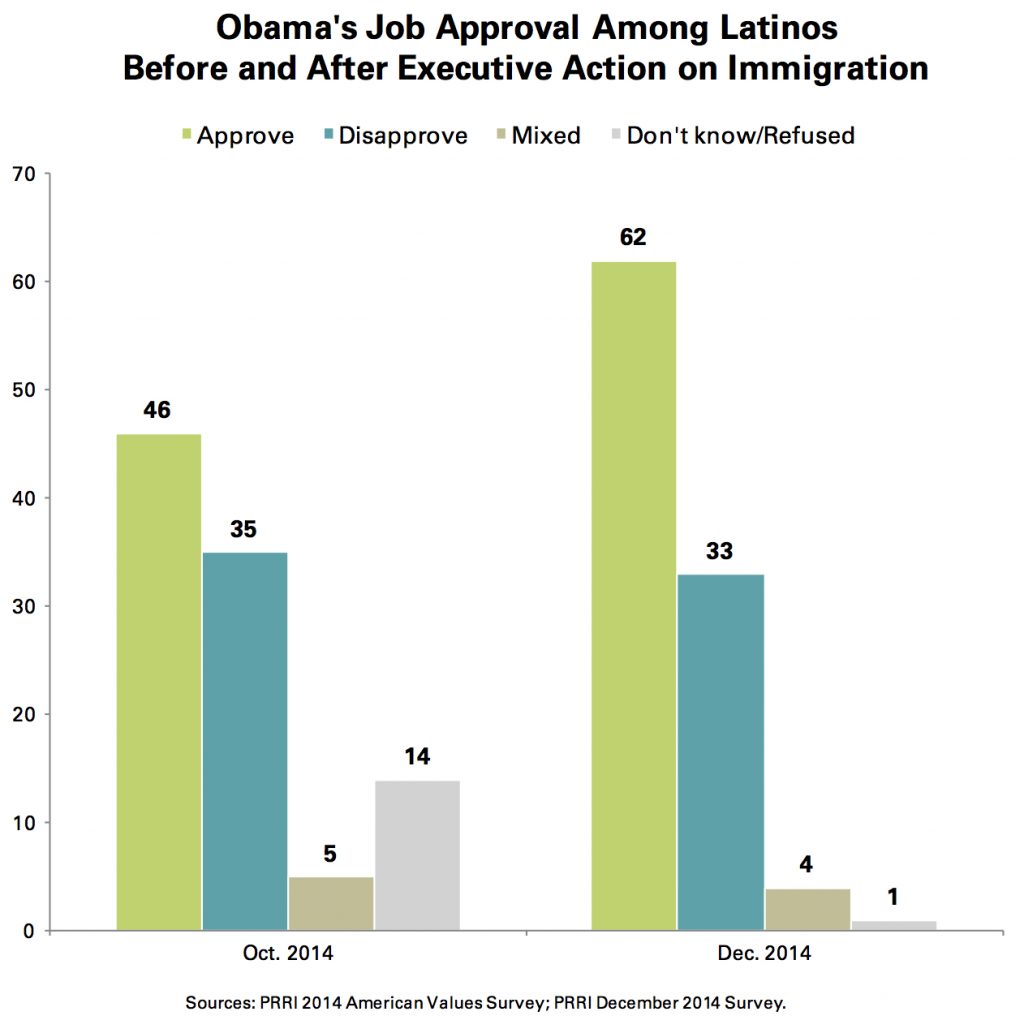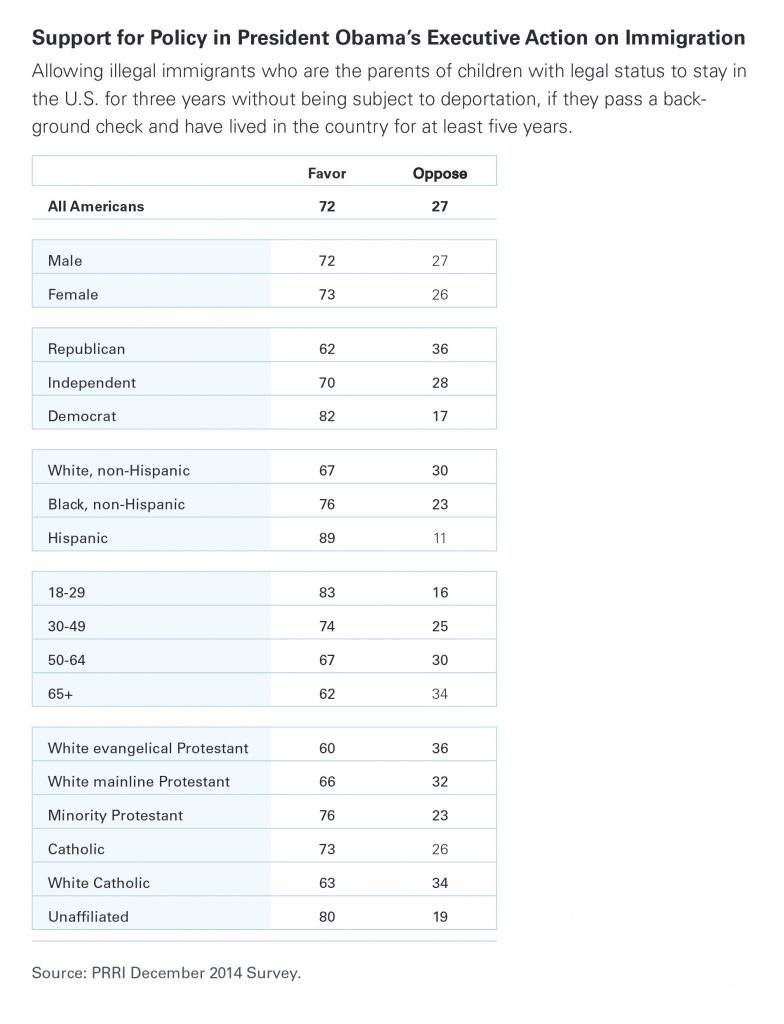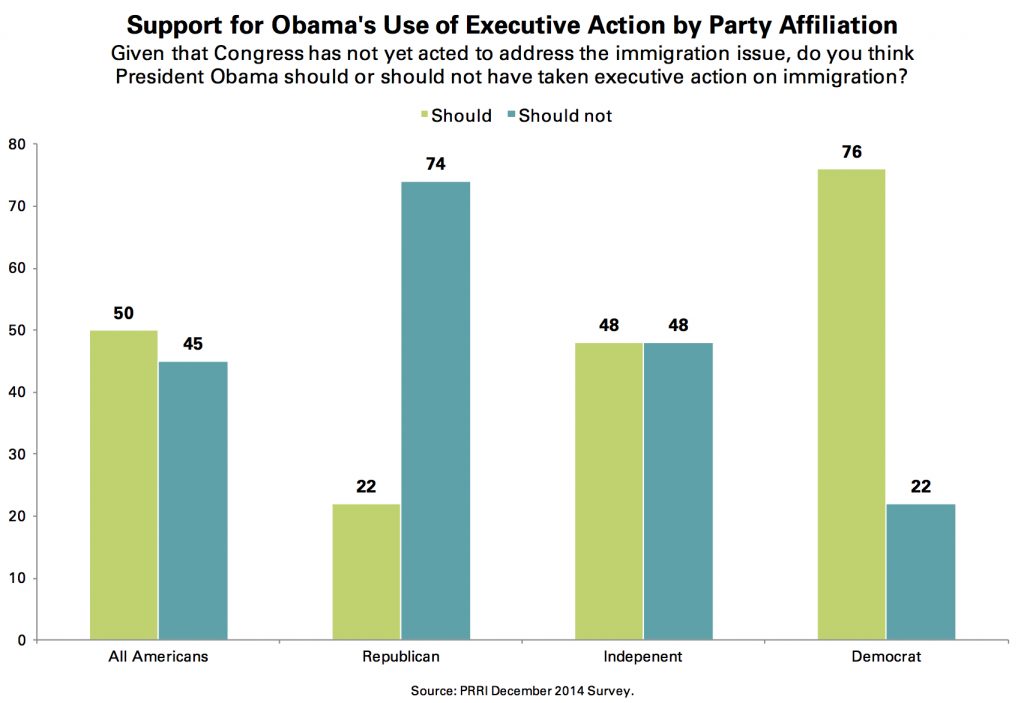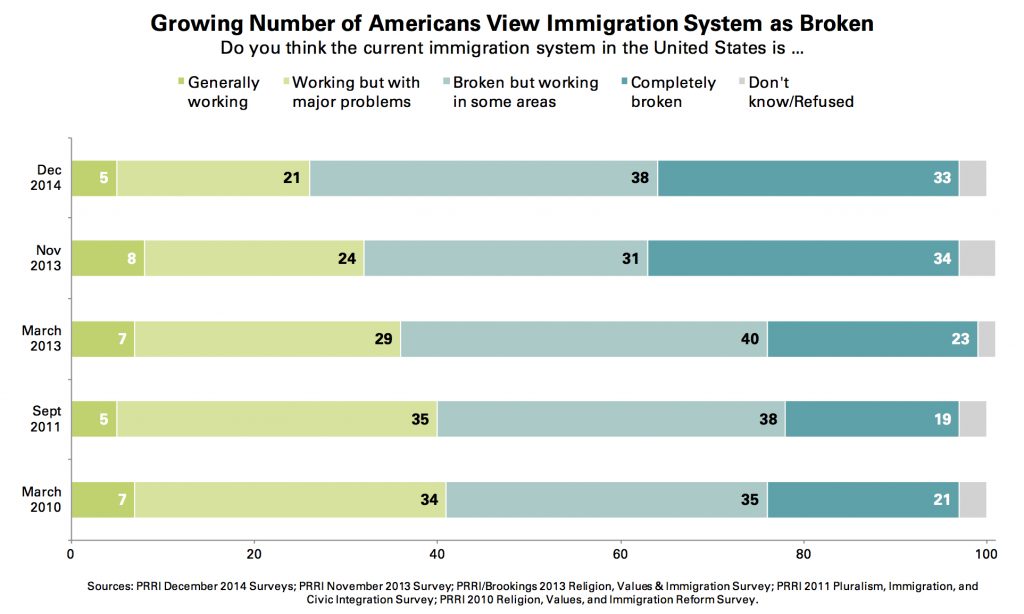I. Americans Generally Aware of President Obama’s Executive Action on Immigration
Close to half (46%) of the public say they have heard a lot about President Obama taking executive action on immigration, and 42% say they have heard a little. Only 12% of the public report having heard nothing at all about it.
Notably, Hispanics are not more likely than Americans overall to report having heard about President Obama’s executive action on immigration. Four-in-ten (40%) Hispanics say they have heard a lot about it, 45% say they have heard a little, and 15% say they have heard nothing at all about it.
II. Most Americans Support Substance of Executive Action on Immigration
More than 7-in-10 (72%) Americans favor allowing illegal immigrants who are the parents of children with legal status to stay in the U.S. for three years without being subject to deportation if they pass a background check and have lived in the country at least five years. Roughly 3-in-10 (27%) Americans oppose this policy.
There is bipartisan and cross-religious support for the policy, although the strength of support varies substantially. More than 8-in-10 (82%) Democrats, 7-in-10 (70%) independents, and more than 6-in-10 (62%) Republicans support allowing illegal immigrants who have children with legal status to remain in the country for three years without being deported if they pass a background check and have lived in the country for five years.
Among religious groups, two-thirds or more of white mainline Protestants (66%), minority Protestants (76%), Catholics (73%), and the religiously unaffiliated (80%) support allowing illegal immigrants who are the parents of children with legal status to stay in the U.S. for three years without being subject to deportation if they pass a background check and have lived in the country at least five years. Six-in-ten (60%) white evangelical Protestants also support the goals of Obama’s executive action, while 36% are opposed.
Relatively few Americans believe President Obama’s executive action on immigration went too far. Roughly one-third (34%) of the public say the executive action went too far, while 26% say it did not go far enough, and 33% say it was about right. White Americans are substantially more likely than Hispanic or black Americans to say Obama’s executive action went too far (42% vs. 18% and 8%, respectively). Roughly half (49%) of Hispanics and a majority (57%) of blacks say the action was about right, compared to only 26% of whites.
III. Americans Divided Over Obama’s Use of Executive Action on Immigration
Americans are divided over whether Obama should have pursued executive action on immigration. Half (50%) of Americans say Obama should have taken action on immigration given that Congress has not acted on the issue, while 45% say he should not have taken action.
There are substantial racial and political divisions in views about whether Obama was right to take action. More than 7-in-10 black and Hispanic Americans (79% and 75%, respectively) believe Obama should have taken executive action on immigration given that Congress has not addressed the issue. Among white Americans, only 41% say he should have taken executive action on the immigration issue, while a majority (55%) believe the President should not have pursued executive action.
Political differences are also stark. More than three-quarters (76%) of Democrats support Obama’s use of executive action on immigration, while roughly as many Republicans (74%) say he should not have taken executive action. Independents are evenly divided over Obama’s use of executive action (48% should vs. 48% should not).
There are also important religious divisions. Majorities of minority Protestants (61%), Catholics (59%), and religiously unaffiliated Americans (55%) say Obama should have taken executive action on immigration. White mainline Protestants are about evenly divided, with 46% supporting Obama’s decision to take executive action and 50% opposing it. White Catholics are also divided, with roughly as many supporting the use of executive action (47%) as opposing it (49%). By contrast, two-thirds (67%) of white evangelical Protestants say Obama should not have taken executive action on immigration compared to 27% who say he should have acted.
IV. Hispanics More Likely to Approve of Obama After Executive Action Announcement
 In the wake of the high profile announcement about the executive action on immigration, President Obama’s job approval rating among Hispanics increased significantly. Currently, more than 6-in-10 (62%) Hispanics say they approve of the job Obama is doing as President—a marked uptick from October 2014 when fewer than half (46%) of Hispanics expressed approval. Obama’s current job approval ratings among white non-Hispanic Americans (31%) and black non-Hispanic Americans (83%) are not significantly different from ratings over the past few months.
In the wake of the high profile announcement about the executive action on immigration, President Obama’s job approval rating among Hispanics increased significantly. Currently, more than 6-in-10 (62%) Hispanics say they approve of the job Obama is doing as President—a marked uptick from October 2014 when fewer than half (46%) of Hispanics expressed approval. Obama’s current job approval ratings among white non-Hispanic Americans (31%) and black non-Hispanic Americans (83%) are not significantly different from ratings over the past few months.
Perceptions of President Obama’s job performance among partisans have also not moved significantly in the wake of his executive action on immigration.
V. Americans More Likely to Say President Obama’s Use of Executive Action Is about Politics than Policy
Americans are generally more apt to perceive Obama’s efforts as mostly about shoring up support among Latino voters rather than being about fixing problems with the immigration system. Half (50%) of the public believe that Obama took executive action mostly to help the Democratic Party with Latino voters, while 42% say he mostly took action to address problems with the current immigration system.
There are considerable racial divisions in views about Obama’s motivations for taking executive action. A majority (55%) of white non-Hispanic Americans believe Obama took action mostly to help the Democratic Party with Latino voters. More than 7-in-10 (71%) blacks say Obama pursued executive action mostly to address problems with the immigration system. Hispanics are roughly evenly divided. Forty-seven percent say the purpose of the action was primarily to win over Hispanic voters, while 41% say it was primarily to fix the system.
VI. Democratic Advantage on Immigration Issue Narrowing
The Democratic Party has a slight advantage over the Republican Party in perceptions about which is better able to handle the issue of immigration. Roughly 4-in-10 (39%) Americans say they trust the Democratic Party more to handle the immigration issue, while 34% say they trust the GOP more to handle it. However, it is notable that approximately one-quarter of Americans say they trust neither party (21%) or don’t know (5%). In 2013, an identical number (39%) of Americans reported trusting the Democrats over the GOP to handle the issue, but fewer said they trusted the Republican Party (29%). At that time, about 3-in-10 Americans said they trusted neither party (23%) or did not know (8%).
There are large racial gaps on this question. Among white Americans, 42% say they most trust the Republican Party on the issue of immigration compared to 29% who say they most trust the Democratic Party; more than one-quarter say they trust neither party (23%) or don’t know (4%). Among Hispanic Americans, a majority (53%) say they most trust the Democratic Party compared to 21% who say they most trust the Republican Party, but about one-quarter say they trust neither party (15%) or don’t know (9%). Black Americans are most likely to trust the Democratic Party over the Republican Party on immigration. Three quarters (75%) of black Americans most trust the Democratic Party compared to six percent who most trust the Republican Party. Fewer than one-in-five black Americans say they trust neither party (13%) or don’t know (5%).
VII. Americans Are Pessimistic about the Passage of Immigration Reform Legislation
A majority of Americans say it is not at all likely (26%) or not too likely (28%) that Congress will pass immigration reform legislation within the next two years. About 4-in-10 say the prospect is somewhat likely (34%) or very likely (10%).
White evangelical Protestants are considerably more optimistic than other religious groups that Congress will pass immigration reform legislation. A majority (54%) of white evangelical Protestants say it is very likely or somewhat likely that Congress will pass legislation on the issue, a view shared by only 35% of white mainline Protestants, 37% of religiously unaffiliated Americans, and 45% of minority Protestants. Catholics are closely divided over whether Congress passing immigration reform is likely or unlikely (48% vs. 50%).
Notably, similar numbers of Republicans (50%) and Democrats (56%) say it is unlikely that Congress will pass immigration reform legislation within the next two years.
VIII. More Americans Believe the Immigration System Is Broken
Americans are more likely to believe that the immigration system is broken today than they were a few years ago. Only five percent of the public say the system is generally working, and 21% say the system is working but with major problems. More than 7-in-10 Americans say the immigration system is either broken but working in some areas (38%) or completely broken (33%). In 2010, a majority of the public said the system was broken but working in a few areas (35%) or completely broken (21%). Seven percent said the system was generally working, while more than one-third (34%) said it was working with some major problems.
Young adults are generally more upbeat than seniors about how the immigration system is functioning. More than one-in-three young adults believe the immigration system is generally working (7%) or working with major problems (28%). In contrast, only one-in-five seniors believe the system is basically working (2%) or working with major problems (18%). Young adults are half as likely as seniors to say the system is completely broken (19% vs. 43%).
IX. Continued Support for Immigration Reform with Path to Citizenship
Views about immigration reform have remained largely unchanged over the last year and a half. Currently, nearly 6-in-10 (58%) Americans say that immigrants living in the country illegally should be allowed to become citizens provided they meet certain requirements, while 19% say they should be allowed to become legal residents but not citizens, and 20% say they should be identified and deported. Early in 2013, 63% of the public said immigrants living in the U.S. illegally should be allowed to become citizens if they meet certain requirements, while 14% said they should be allowed to become legal residents but not citizens, and 21% said they should be identified and deported.
More than 6-in-10 (64%) Americans favor allowing illegal immigrants who were brought to the U.S. as children to gain legal resident status if they join the military or attend college, while 34% oppose it. In 2011, 57% supported allowing illegal immigrants brought into the country as children to become legal residents if they met these conditions. Forty percent opposed this policy.
X. Uptick in Concern about Negative Cultural Impact of Immigrants
There is modest uptick in concern about the cultural threat posed by newly arriving immigrants. Today, Americans are closely divided over whether immigrants coming to the U.S. threaten traditional American customs and values (45%) or strengthen American society (48%). In 2013, a majority (54%) of the public said the growing number of newcomers strengthens American society, while 4-in-10 (40%) said they threaten traditional American customs and values.
XI. Racial Divides Continue Over Fairness of Criminal Justice System
A majority (53%) of Americans disagree that blacks and other minorities receive equal treatment in the criminal justice system, compared to 46% who agree. There are large racial divides on this question. A majority (52%) of whites agree with this statement, compared to 44% of Hispanics and only 12% of African Americans.
Among religious groups, black Protestants and white evangelical Protestants are deeply divided on this question. Two thirds (66%) of white evangelical Protestants agree that blacks and other minorities receive treatment equal to whites in the criminal justice system. More than eight in 10 (82%) black Protestants disagree with this statement.
Recommended citation:
Jones, Robert P., and Daniel Cox. “Most Americans Support Goals, but Divided over Use of Executive Action on Immigration.” PRRI. 2014. http://www.prri.org/research/religion-politics-tracking-survey-december-2014/.





